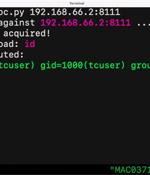Security News

NSO Group, the Israel-based maker of super-charged snoopware Pegasus, has been ordered by a federal judge in California to share the source code for "All relevant spyware" with Meta's WhatsApp. The order [PDF] from Judge Phyllis Hamilton follows from WhatsApp's 2019 lawsuit [PDF] against NSO for allegedly spying on 1,400 WhatsApp users.

The alleged source code for the third iteration of the Knight ransomware is being offered for sale to a single buyer on a hacker forum by a representative of the operation. Knight ransomware launched at the end of July 2023 as a re-brand of the Cyclops operation, targeting Windows, macOS, and Linux/ESXi systems.

Cloudflare has revealed that it was the target of a likely nation-state attack in which the threat actor leveraged stolen credentials to gain unauthorized access to its Atlassian server and...

Cloudflare has just detailed how suspected government spies gained access to its internal Atlassian installation using credentials stolen via a security breach at Okta in October. The October Okta security breach involved more than 130 customers of that IT access management biz, in which snoops swiped data from Okta in hope of drilling further into those organizations.

A mishandled GitHub token gave unrestricted access to Mercedes-Benz's internal GitHub Enterprise Service, exposing source code to the public. On September 29, 2023, researchers at RedHunt Labs discovered a GitHub token in a public repository belonging to a Mercedez employee that gave access to the company's internal GitHub Enterprise Server.

A threat actor announced on a cybercrime forum that they sold the source code and a cracked version of the Zeppelin ransomware builder for just $500. The post was spotted by threat intelligence company KELA and while the legitimacy of the offer has not been validated, the screenshots from the seller indicate that the package is real. The seller of the Zeppelin source code and builder uses the handle 'RET' and clarified that they did not author the malware but simply managed to crack a builder version for it.

The source code for Grand Theft Auto 5 was reportedly leaked on Christmas Eve, a little over a year after the Lapsus$ threat actors hacked Rockstar games and stole corporate data. Links to download the source code were shared on numerous channels, including Discord, a dark web website, and a Telegram channel that the hackers previously used to leak stolen Rockstar data.

The threat actors behind a new ransomware group called Hunters International have acquired the source code and infrastructure from the now-dismantled Hive operation to kick-start its own efforts in the threat landscape. While it's common for ransomware actors to regroup, rebrand, or disband their activities following such seizures, what can also happen is that the core developers can pass on the source code and other infrastructure in their possession to another threat actor.

A threat actor has leaked the complete source code for the first version of the HelloKitty ransomware on a Russian-speaking hacking forum, claiming to be developing a new, more powerful encryptor. A threat actor named Gookee has been previously associated with malware and hacking activity, attempting to sell access to Sony Network Japan in 2020, linked to a Ransomware-as-a-Service operation called 'Gookee Ransomware,' and trying to sell malware source code on a hacker forum.

A critical security vulnerability in the JetBrains TeamCity continuous integration and continuous deployment (CI/CD) software could be exploited by unauthenticated attackers to achieve remote code...